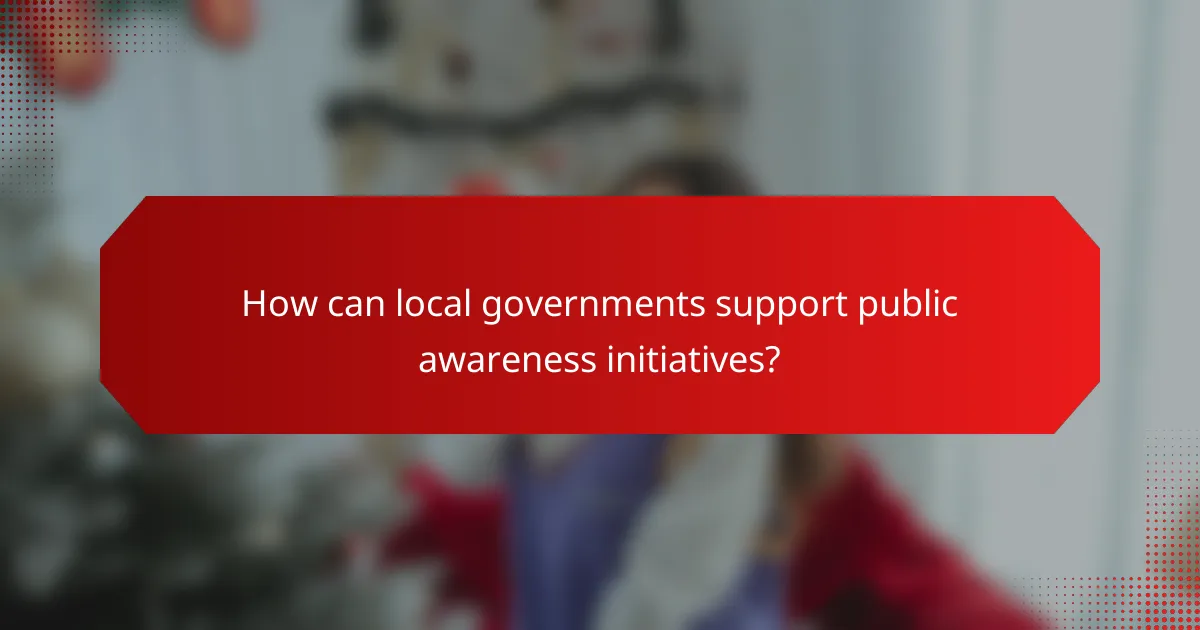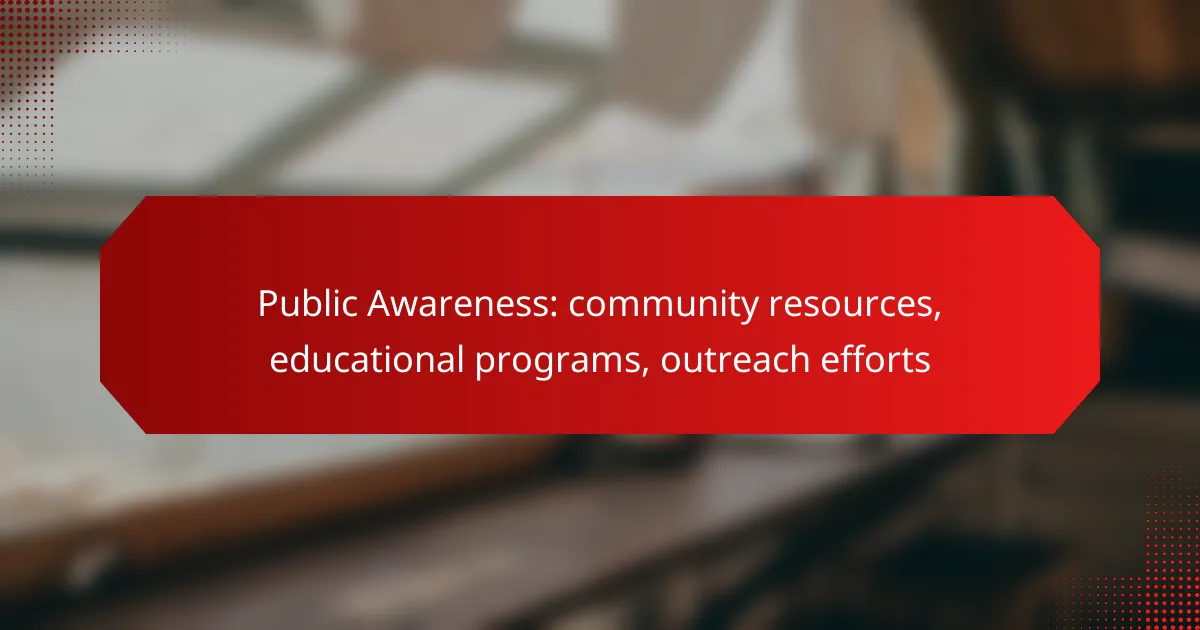Public awareness initiatives in the UK are essential for connecting residents with vital community resources, educational programs, and outreach efforts. By providing access to local health services, non-profit organizations, and community centers, these initiatives empower individuals to engage with important issues and services. Educational programs specifically designed to inform and engage diverse demographics further enhance community involvement, fostering a more informed and cohesive society.

What community resources are available in the UK?
The UK offers a variety of community resources designed to support residents in accessing essential services, education, and social support. These resources include local health services, non-profit organizations, community centers, public libraries, and support groups, each playing a vital role in enhancing public awareness and engagement.
Local health services
Local health services in the UK provide essential medical care and health education to communities. These services include general practitioners (GPs), clinics, and mental health services, which are often funded by the National Health Service (NHS). Residents can register with a GP to access a range of health services, including vaccinations, screenings, and consultations.
To find local health services, individuals can visit the NHS website or contact their local authority for information on available facilities and specialists. Utilizing these services can help improve overall community health and well-being.
Non-profit organizations
Non-profit organizations in the UK focus on various social issues, providing support and resources to those in need. These organizations often address areas such as poverty, education, mental health, and homelessness. Examples include Shelter, which helps with housing issues, and Mind, which offers mental health support.
Engaging with non-profit organizations can provide access to valuable resources, including counseling, educational programs, and advocacy. Many of these organizations rely on volunteers, so community members can also contribute by getting involved.
Community centers
Community centers serve as hubs for local activities, offering a space for social interaction, educational programs, and recreational activities. These centers often host workshops, classes, and events aimed at fostering community engagement and personal development.
Residents can benefit from the diverse programs available at community centers, which may include fitness classes, art workshops, and youth programs. To find a community center nearby, check local council websites or community boards for listings and schedules.
Public libraries
Public libraries in the UK are valuable resources for education and community engagement. They provide access to a wide range of books, digital resources, and educational programs, including literacy classes and workshops for all ages.
Libraries often host events such as author talks, reading groups, and children’s storytime sessions, making them a great place for social interaction and learning. Many libraries also offer free internet access and computer training, which can be beneficial for job seekers and students.
Support groups
Support groups in the UK offer a safe space for individuals facing similar challenges to share experiences and provide mutual support. These groups can focus on various issues, including mental health, addiction, grief, and chronic illness.
Joining a support group can help individuals feel less isolated and gain practical advice from others who understand their situation. Many support groups are facilitated by trained professionals and are often free or low-cost, making them accessible to a wide range of people.

What educational programs promote public awareness?
Educational programs that promote public awareness focus on informing communities about important issues, resources, and services available to them. These programs often target specific demographics and utilize various formats to effectively reach and engage participants.
School-based programs
School-based programs are designed to educate students about health, safety, and social issues relevant to their communities. These programs can include curriculum integration, guest speakers, and interactive activities that encourage student participation.
For instance, programs on mental health awareness or substance abuse prevention can be implemented in middle and high schools, fostering a supportive environment where students learn to recognize and address these issues.
Workshops and seminars
Workshops and seminars provide hands-on learning experiences that can enhance public awareness on various topics. These events often feature experts who share knowledge and facilitate discussions, allowing participants to ask questions and engage directly.
Community centers or local organizations frequently host these events, covering topics such as financial literacy, nutrition, or emergency preparedness. Attendees can gain practical skills and resources to apply in their daily lives.
Online courses
Online courses offer flexible learning opportunities for individuals seeking to improve their understanding of specific issues. These courses can range from short informational sessions to comprehensive programs that provide certifications.
Platforms like Coursera or local educational institutions may offer courses on public health, environmental awareness, or civic engagement, making it easier for participants to access valuable information at their convenience.
Public health campaigns
Public health campaigns aim to raise awareness about health-related issues through various media channels. These campaigns often utilize social media, television, and print materials to disseminate information widely.
Examples include anti-smoking initiatives, vaccination drives, and mental health awareness campaigns, which encourage community members to take proactive steps towards improving their health and well-being. Engaging visuals and clear messaging are crucial for the effectiveness of these campaigns.

How do outreach efforts improve community engagement?
Outreach efforts enhance community engagement by actively involving residents in local initiatives and fostering connections among diverse groups. These efforts create opportunities for participation, education, and collaboration, leading to a more informed and cohesive community.
Volunteer initiatives
Volunteer initiatives are crucial for building community engagement as they encourage residents to contribute their time and skills to local projects. These programs can range from organizing clean-up days to mentoring youth, providing a sense of ownership and pride in the community.
To effectively implement volunteer initiatives, organizations should clearly define roles and responsibilities, ensuring that volunteers feel valued and engaged. Regular training sessions and recognition events can help maintain enthusiasm and commitment among volunteers.
Social media campaigns
Social media campaigns serve as powerful tools for outreach, allowing organizations to reach a wider audience quickly and effectively. By sharing informative content, success stories, and upcoming events, these campaigns can spark interest and encourage community participation.
To maximize impact, campaigns should use engaging visuals and clear calls to action. It’s essential to interact with followers by responding to comments and messages, creating a two-way dialogue that fosters a sense of community online.
Community events
Community events, such as fairs, workshops, or informational sessions, provide opportunities for residents to connect face-to-face. These gatherings can help build relationships, share resources, and promote local programs, ultimately enhancing community cohesion.
When planning community events, consider factors like location, accessibility, and timing to ensure maximum participation. Offering incentives, such as free food or entertainment, can also attract more attendees and create a welcoming atmosphere.

What criteria should be considered when selecting resources?
When selecting resources for community awareness and educational programs, consider accessibility, reputation, and target audience. These criteria help ensure that the resources are effective, reliable, and relevant to those they aim to serve.
Accessibility
Accessibility refers to how easily individuals can obtain and use the resources. Consider factors such as location, availability in multiple languages, and whether materials are provided in formats suitable for people with disabilities. For example, resources should be available online and in-person to accommodate different preferences.
Additionally, ensure that the resources are free or low-cost to eliminate financial barriers. Many community programs offer free workshops or materials, which can significantly enhance participation.
Reputation
The reputation of a resource is crucial for building trust within the community. Look for organizations or programs that have a proven track record of success and positive feedback from participants. Reviews, testimonials, and endorsements from local leaders can help gauge credibility.
Research any certifications or affiliations with recognized bodies, as these can indicate a commitment to quality and standards. For instance, resources endorsed by educational institutions or government agencies often carry more weight.
Target audience
Understanding the target audience is essential for selecting appropriate resources. Identify the demographics, interests, and needs of the community members you aim to reach. Tailoring resources to specific groups, such as youth, seniors, or non-native speakers, can enhance engagement and effectiveness.
Consider conducting surveys or focus groups to gather insights about the community’s preferences and challenges. This information can guide the selection of resources that resonate with the audience and address their specific concerns.

How can local governments support public awareness initiatives?
Local governments can enhance public awareness initiatives by providing funding, forming partnerships, and developing supportive policies. These actions create a framework for effective community engagement and education, ensuring resources are available for outreach efforts.
Funding programs
Funding programs are essential for launching and sustaining public awareness initiatives. Local governments can allocate budgetary resources or apply for grants to support educational campaigns, community events, and outreach activities. For example, a city might set aside a portion of its budget to fund workshops that educate residents about health and safety.
When creating funding programs, governments should consider the specific needs of their communities. Engaging with local stakeholders can help identify priority areas for investment, ensuring that funds are directed toward initiatives that will have the most significant impact.
Partnerships with NGOs
Forming partnerships with non-governmental organizations (NGOs) can amplify the reach and effectiveness of public awareness efforts. NGOs often have established networks and expertise in community engagement, making them valuable allies in outreach initiatives. For instance, a local government might collaborate with an environmental NGO to promote recycling programs.
When partnering with NGOs, it is crucial to establish clear goals and responsibilities. This clarity helps ensure that both parties are aligned in their objectives and can effectively measure the success of their collaborative efforts.
Policy development
Policy development plays a critical role in supporting public awareness initiatives. Local governments can create policies that mandate educational programs on important issues, such as public health or environmental sustainability. These policies can provide a structured approach to outreach and ensure that resources are allocated appropriately.
In developing policies, local governments should engage community members to gather input and foster a sense of ownership. This participatory approach not only enhances the relevance of the policies but also encourages community buy-in, which is vital for the success of awareness initiatives.

What are the emerging trends in public awareness efforts?
Emerging trends in public awareness efforts focus on leveraging technology, community engagement, and targeted educational programs. These approaches aim to enhance outreach and connect with diverse populations effectively.
Community Resources
Community resources play a crucial role in public awareness by providing accessible information and support. Local organizations often collaborate to create resource hubs that offer educational materials, workshops, and events tailored to specific community needs.
For example, libraries and community centers may host informational sessions on health, safety, or environmental issues. These initiatives foster a sense of belonging and encourage active participation among residents.
Educational Programs
Educational programs are essential for raising awareness and equipping individuals with knowledge. These programs can range from school-based initiatives to adult education courses, focusing on topics like health literacy, financial management, or civic engagement.
Effective educational programs often incorporate interactive elements, such as hands-on activities or discussions, to engage participants. Collaborations with local experts can enhance credibility and relevance, making the information more impactful.
Outreach Efforts
Outreach efforts aim to connect with underserved populations and raise awareness about available resources. Strategies may include door-to-door campaigns, social media engagement, and partnerships with local businesses or influencers to reach a broader audience.
Successful outreach requires understanding the unique barriers faced by different communities, such as language or cultural differences. Tailoring messages and materials to resonate with specific groups can significantly improve engagement and participation rates.
